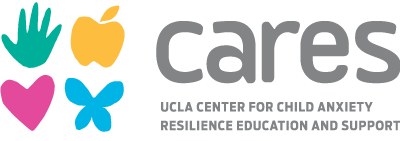Finding Evidence-Based Treatment for Anxiety
back to Resources for Families
If you think your child is experiencing symptoms of anxiety, you might consider speaking to a professional. Seek care from professionals trained in evidence-based practices. Here are some questions to ask when searching for and meeting a new therapist.
Finding the Right Therapist
There are many types of therapists who specialize in different types of treatments. The questions below can help you select a therapist who is qualified to work with children, knowledgeable about childhood anxiety, and sensitive to your family’s needs—in other words, a good fit for your family.
What type of license do you hold?
It is important to find a therapist who holds a license to practice therapy or is supervised by a licensed clinician. Therapists should readily share this information with you. For more information about licenses and types of providers, click here.
What type of training do you have in treating childhood anxiety?
Childhood anxiety is a unique challenge, and specific training in the treatment and prevention of childhood anxiety disorders is recommended. Even if a therapist did not get their training in school, they may have sought additional professional training or supervised experience to gain expertise in this field.
How much experience do you have treating childhood anxiety?
It is okay to ask how long a therapist has been practicing and how often they treat children with anxiety disorders. If your child has a specific and targeted area of concern, it can be helpful to ask if the therapist has any experience treating that particular disorder or behavioral issue.
What is your approach to treatment?
In general, cognitive behavioral therapy (CBT) is the most recommended approach for treating childhood anxiety. Some therapists also take a family approach and include the entire family in treatment. Ideally, the family treatment will teach CBT skills to both the anxious child and other family members.
Find a therapist who treats childhood anxiety.
Learning About Treatment
These key questions can help you learn more about a specific therapist’s style and treatment plan.
How much and in what ways will we (the parents) be involved in treatment?
Child mental health providers vary in terms of how much they include parents in the treatment of kids and teens. You might be more involved if you have a younger child or if you have an adolescent who is experiencing problems that affect daily routines or other family members.
How much work outside of the therapy sessions will my child have? What will this work entail?
Some therapists will assign “homework” to be done in between sessions – usually at home, but sometimes at school or in other settings. Therapists who use cognitive behavior therapy (CBT) – the most recommended approach for treating anxiety problems – often stress the importance of homework. This homework usually consists of practicing the skills and techniques learned in session. You and other important adults in your child’s life may also have therapy assignments to practice in between your child’s sessions.
How often will my child have therapy sessions, and how long will the treatment take?
The amount of time that your child is in treatment will depend on many factors. Ask the therapist to estimate how long treatment will take, and how they will determine when treatment should end.
What kinds of things will my child do in therapy sessions?
What happens in session really depends on the type of therapy that the provider practices. Therapists commonly use games or arts and crafts in their sessions, especially with younger children. It is also common to spend time talking or writing about feelings. In CBT sessions, children also typically learn and practice different anxiety management strategies, such as deep breathing and using positive coping thoughts. Then they practice using these strategies in situations that make them feel anxious. You can ask the therapist what they and your child will do in session, what they will talk about, and what kind of activities can be expected.
